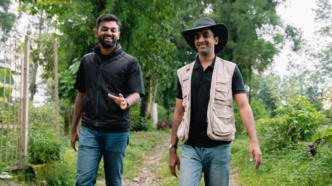What started as a last-ditch trip to save a bankrupt tea estate in Darjeeling has evolved into one of India’s most promising climate tech stories. Alt Carbon, a startup founded by brothers Shrey and Sparsh Agarwal, has secured $12 million in seed funding to expand its carbon dioxide removal operations across India. The round was led by Lachy Groom, co-founder of Physical Intelligence, with support from several strategic climate investors.
The story began in 2020, when the Agarwal siblings returned to their family’s estate in Darjeeling, expecting to shut it down. Instead, they saw a chance to reimagine its future—by tapping into the carbon credit economy. Their research led them to enhanced rock weathering, a powerful but underutilized method of permanently storing atmospheric carbon.
Unlike many avoidance-based carbon credit schemes in India that produce questionable results, Alt Carbon is focused on high-integrity removal. Through a process that mimics nature’s own carbon sequestration, the startup spreads finely crushed basalt rock—waste material from mining—on farmland. When this dust interacts with rainwater, it reacts with CO₂ to form bicarbonates that eventually turn into stable carbonates, storing carbon for over 10,000 years.
Alt Carbon piloted this solution on 500 acres of their family’s tea estate. Within months, they had expanded to other crops like rice and bamboo across North Bengal. Now, they plan to reach 500,000 hectares and aim to remove 5 million tons of carbon by 2030.
The startup sources basalt dust from the Rajmahal Traps, a volcanic region in eastern India, and repurposes construction waste, avoiding emissions from new mining or crushing. Their proprietary mixture, called Hari Maati (which means “green soil” in Hindi), combines basalt dust with organic matter to improve adoption among farmers by enhancing soil health and crop yields.
Unlike direct air capture methods that can cost upwards of $800 per ton, Alt Carbon estimates its credits at $270 per ton. And thanks to rapid innovation, they expect this cost to fall dramatically within the next three to four years.
Behind the scenes, the company uses a multilayered approach to validate its carbon removal claims. First, it measures soil and water chemistry on-site. Then, it uses custom models to track how weathering minerals flow into rivers. Finally, advanced machine learning models estimate long-term carbon storage, all calibrated against strict standards like those set by Isometric, Puro.earth, SBTi, ICVCM, and CORSIA.
With research labs in Darjeeling and Bengaluru and a team of 25—including up to 10 PhDs—the startup is now investing in lab expansion, remote sensing, and new hardware for more accurate soil sampling. It also plans to use ground-based sensors for faster and cheaper data collection.
Last year, Alt Carbon received a $500,000 pre-purchase from Frontier and joined a $1 billion advanced market commitment with Stripe, Meta, Alphabet, Shopify, and McKinsey. More recently, it signed offtake agreements with NextGen—a coalition including Mitsubishi Corporation, Swiss RE, BCG, and UBS—and MOL Group, Japan’s shipping giant, which committed to buying 10,000 tons of carbon credits.
Its first batch of verified credits, delivered through Isometric, will be issued within weeks. And with fresh funding in hand, Alt Carbon is racing ahead to put India’s farmland at the heart of global carbon removal innovation.












